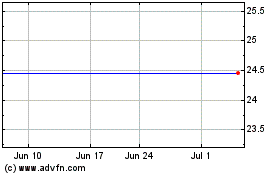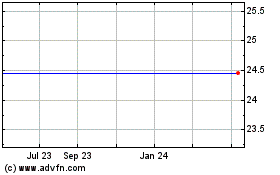By Cara Lombardo, Dana Cimilluca and Drew FitzGerald
AT&T Inc. is in talks to combine its sprawling WarnerMedia
division with Discovery Inc., according to people familiar with the
matter, potentially unwinding the telecom giant's signature bet on
media, as pressure on the traditional entertainment business
mounts.
The talks, which likely value the AT&T business at well over
$50 billion with debt, could lead to an agreement by Monday, the
people said, who cautioned that the talks could still fall
apart.
A deal between WarnerMedia and Discovery would further
consolidate a media business buffeted by cord-cutting and
competition from streaming video. WarnerMedia owns cable channels
such as HBO, CNN, TNT and TBS as well as the Warner Bros.
television and film studio. Discovery has a portfolio that includes
its namesake network and HGTV.
Discovery Chief Executive David Zaslav is expected to head the
new company, people familiar with the matter said.
It is uncertain whether Jason Kilar, the current chief executive
of WarnerMedia, will stay on in a lesser role.
The potential tie-up would be a surprising U-turn by AT&T,
which placed a massive bet on media with its 2018 acquisition of
Time Warner Inc. for around $81 billion. That deal made it the
world's most indebted nonfinancial company.
If the transaction moves forward, AT&T Chief Executive John
Stankey will have unwound the two biggest deals done by his
predecessor, Randall Stephenson, in his 10 months in charge.
Earlier this year the company reached a deal with private-equity
firm TPG to shed a 30% stake in its DirecTV business for $1.8
billion. AT&T had acquired DirecTV in 2015 for $49 billion.
Mr. Stephenson retired as CEO last summer. Mr. Stankey, a
telephone business veteran, was a key backer of the megamergers and
later led the integration of both businesses.
Mr. Stankey has said he would treat no asset as sacred and can
shed any business that doesn't contribute to its parent's overall
value. DirecTV has lost more than 7 million subscribers over the
past two years.
The transaction being discussed would use a tax-efficient
structure and involve spinning WarnerMedia out of AT&T and
combining it with Discovery, the people said. AT&T shareholders
would own a significant stake in the combined company, they
said.
Bloomberg first reported on the talks.
Both AT&T and Discovery face daunting challenges in the
traditional TV business, as more consumers go without cable and
satellite TV connections. Since 2010, about 35 million households
have dropped their subscriptions to pay-TV channel packages or have
skipped signing up in the first place, according to market research
firm MoffettNathanson LLC.
AT&T has staked much of its future in media on HBO Max, an
expanded online version of the premium cable channel that is
designed to compete with big streaming rivals like Netflix Inc. and
Walt Disney Co.'s Disney+.
Discovery, which specializes in nonfiction programming, has its
own streaming service called Discovery+.
WarnerMedia's sprawling operations were a hard-won prize for
AT&T. The company spent nearly two years battling government
regulators and an antitrust challenge from the U.S. Department of
Justice, which argued that combining the top U.S. pay-TV
distributor with one of the industry's biggest channel owners would
hurt competition. AT&T rebuffed offers to divest parts of
either business and ultimately won in federal court.
AT&T has aggressively sold investors on its streaming-video
strategy.
Mr. Stankey has cited HBO Max as the cornerstone of an
entertainment business that keeps wireless and broadband customers
engaged while earning a healthy profit itself. WarnerMedia boss
Jason Kilar said in a recent interview that the on-demand
entertainment service will be generating far more revenue for its
corporate parent than executives expected if keeping its current
pace. He joined the company last year shortly before HBO Max's
launch.
The entire WarnerMedia division generated about $8.5 billion of
revenue for AT&T in the March quarter. Total domestic HBO
subscriptions rose to about 44 million, up from 33 million a year
earlier.
The direct-to-consumer business growth, almost entirely from HBO
Max, still comes at a steep price to AT&T, which has committed
billions of additional dollars to grow the service's library of
movies and TV shows. The media business also competes for resources
with AT&T's core wireless arm, the country's third-largest
cellphone carrier.
Some investors have complained about AT&T's stewardship of
its media assets and the debt it amassed to close the Time Warner
deal -- and the transaction under discussion could help the company
reduce its borrowings. AT&T shares closed Friday at $32.24,
down about 25% since mid-2016, giving the company a market value of
about $230 billion.
AT&T has had opportunities in recent years to divest CNN,
which was regularly attacked by former President Donald Trump, but
the telecom company held on to the network, viewing it as a
valuable financial contributor. CNN's ratings boomed during
election season, thrusting it into the top spot in total prime-time
viewership, but the network has lost ground amid a wider decline in
news ratings. Fox News has regained the No. 1 spot in that
category.
Fox News parent Fox Corp. and Wall Street Journal parent News
Corp share common ownership.
CNN President Jeff Zucker is expected to leave the cable channel
when his contract expires later this year. A potential successor,
if a deal is completed, isn't clear.
TNT and TBS carry general entertainment programming, but much of
their value is in their rights to air major sporting events,
including NBA basketball and college basketball's "March Madness"
tournament.
Some employees in these cable channels -- once known as the
Turner networks -- have complained that AT&T has starved them
of resources and attention, as it favors HBO Max. AT&T
executives have disputed that charge. Mr. Kilar said at a
MoffettNathanson investor conference last week that a recent
seven-year deal to air National Hockey League games was "a sign to
the market that we are investing in the Turner networks" for the
long haul.
AT&T still earns most of its profits from mobile-phone and
broadband service. Its reported net debt surged to $169 billion at
the end of March following an expensive Federal Communications
Commission auction for wireless spectrum licenses. The Dallas-based
company will need to spend billions of dollars over the coming
years to build and maintain an ultrafast fifth-generation wireless
network to keep up with rivals T-Mobile US Inc. and Verizon
Communications Inc.
AT&T's business is now a conglomerate pulled in several
directions by its debt load, its obligations as a telecom network
operator and the big-budget outlays of its film and TV studios. The
company also pays a quarterly dividend that costs about $15 billion
a year. The board last year froze the dividend amount after more
than 30 years of annual increases but stopped short of cutting a
payout that many investors depend on for steady income.
Discovery and AT&T had talks two years ago about teaming up
on a joint-venture, according to people familiar with the
discussions. At the time, Mr. Stankey wasn't interested in pursuing
a deal with Discovery, the people said.
Discovery's Mr. Zaslav is close to WarnerMedia executive Jeff
Zucker, who heads CNN and the company's sports-media businesses.
The two worked together for years at NBC and remained good
friends.
Mr. Zaslav also has Hollywood ties. He is close to director
Steven Spielberg and other powerful players in the entertainment
business. He recently bought the Beverly Hills home of legendary
movie executive Robert Evans, who died in 2019, and is having it
restored.
Discovery, known for TV shows such as "90 Day Fiancé" and
"Diners, Drive-Ins and Dives," has recently stepped up its
investment in the streaming-video sector. The company placed most
of its shows into Discovery+ and operates niche streaming services
such as Eurosport Player and Food Network Kitchen. Together,
Discovery's streaming services have 15 million subscribers
globally.
Billionaire media mogul John Malone is a major Discovery
shareholder, who also controls a significant part of Charter
Communications Inc., which competes with AT&T in the broadband
business.
Discovery has seen its profitability decline recently, as it
invests more of its income into streaming. The company said its net
income fell to $140 million in the first quarter, a decrease of
about 63% compared with the same period last year. Its total
revenue was $2.79 billion, a 4% increase.
Discovery shares, meanwhile, were soaring earlier this year,
leaving many on Wall Street bewildered. The run-up largely stemmed
from Archegos Capital Management, a family investment vehicle run
by Bill Hwang, taking huge positions in a handful of blue-chip
companies, including Discovery, by borrowing heavily from
investment banks. As Archegos incurred losses and rushed to
liquidate positions, the companies' share prices cratered. Class A
shares of Discovery dropped 27% in one day, their largest
percentage decrease since September 2008.
--Benjamin Mullin and Joe Flint contributed to this article.
Write to Cara Lombardo at cara.lombardo@wsj.com, Dana Cimilluca
at dana.cimilluca@wsj.com and Drew FitzGerald at
andrew.fitzgerald@wsj.com
(END) Dow Jones Newswires
May 16, 2021 23:53 ET (03:53 GMT)
Copyright (c) 2021 Dow Jones & Company, Inc.
Discovery (NASDAQ:DISCB)
Historical Stock Chart
From Mar 2024 to Apr 2024

Discovery (NASDAQ:DISCB)
Historical Stock Chart
From Apr 2023 to Apr 2024
